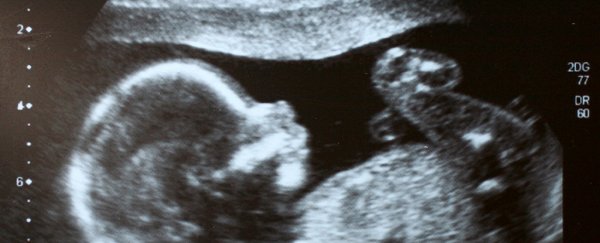The exact causes of schizophrenia are veiled in mystery, but scientists have been trying to work out whether it could develop during pregnancy. Now a powerful new study has pointed to the mum's placenta as a key place to look - and it could be the missing clue we've been needing.
Scientists have long hypothesised that schizophrenia is a neurodevelopmental disorder brought about during pregnancy or shortly after birth, but it wasn't clear what brings it on.
Some studies suggest the disorder could be 80 percent genetic. Others have found that complications in early life may increase the risk of schizophrenia by two-fold, thus bringing about a sort-of "nature vs. nurture" debate.
The new research reveals that during some complicated pregnancies - say, when a woman develops a virus - certain schizophrenia-linked genes are turned on in the mother's placenta, affecting its health and thereby indirectly altering the foetus's early brain development.
"For the first time, we have found an explanation for the connection between early life complications, genetic risk, and their impact on mental illness and it all converges on the placenta," said neurobiologist Daniel Weinberger from Lieber Institute for Brain Development (LIBD).
Using genetic testing and obstetrical history information from a diverse group of nearly 3,700 adults, 2,038 of whom had schizophrenia, the researchers found a significant interaction between nature and nurture factors within the placenta.
The findings suggest that a combination of high genetic risk and serious pregnancy complications can increase the likelihood of developing schizophrenia by five-fold compared to those who just have a high genetic risk.
To find out more, the researchers examined multiple placenta tissue samples, making sure to look at those from complicated pregnancies - like dangerously high maternal blood pressure, premature birth, and emergency Caesarian-sections.
The findings were striking. In placentas from complicated pregnancies, schizophrenia-linked genes were indeed switched on. And, even more interesting, the more of these genes were turned on, the more the placenta showed signs of distress, like inflammation.
Plus, the study found that in placentas from male offspring, the genes that were turned on were far more abundant, suggesting that the child's sex also plays a role here.
"The surprising results of this study make the placenta the centerpiece of a new realm of biological investigation related to how genes and the environment interact to alter the trajectory of human brain development," said Weinberger.
It's a "new realm" because even though the placenta is a crucial organ in pregnancy, it is also one of the most neglected by scientists. In fact, the placenta is the only organ removed from the body that is not routinely examined.
The new study, which found that a third of the genes associated with schizophrenia are expressed in the placenta, just goes to show what an oversight this has been.
And while experts still don't know exactly what these genes do in the placenta, it's possible they could play a key role in influencing other neurodevelopmental disorders like ADHD, Tourettes and autism.
"The placenta is the missing link between maternal risk factors that complicate pregnancies and the development of the fetal brain and the emergence of developmental behaviour disorders," Weinberger told Scientific American.
If the research is verified, the findings could allow scientists to more accurately predict who is most at risk of developing similar disorders.
The study has been published in Nature Medicine.
